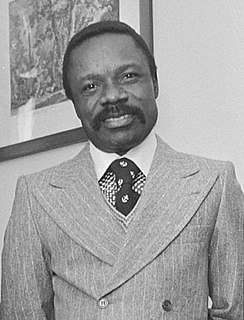A Quote by Bella Abzug
Our struggle was political, ideological and economic, and we felt we couldn't make something of ourselves unless we bettered society. We saw the two together.
Related Quotes
It will take a long period to decide the issue in the ideological struggle between socialism and capitalism in our country. The reason is that the influence of the bourgeoisie and of the intellectuals who come from the old society will remain in our country for a long time to come, and so will their class ideology. If this is not sufficiently understood, or is not understood at all, the gravest mistakes will be made and the necessity of waging the struggle in the ideological field will be ignored.
Nowadays, to say that we are clever animals is not to say something philosophical and pessimistic but something political and hopeful - namely, if we can work together, we can make ourselves into whatever we are clever and courageous enough to imagine ourselves becoming. This is to set aside Kant's question "What is man?" and to substitute the question "What sort of world can we prepare for our great grandchildren?
[T]here are, at bottom, basically two ways to order social affairs, Coercively, through the mechanisms of the state - what we can call political society. And voluntarily, through the private interaction of individuals and associations - what we can call civil society. ... In a civil society, you make the decision. In a political society, someone else does. ... Civil society is based on reason, eloquence, and persuasion, which is to say voluntarism. Political society, on the other hand, is based on force.
...we rarely confide in those who are better than we. Rather, we are more inclined to flee their society. Most often, on the other hand, we confess to those who are like us and who share our weaknesses. Hence we don't want to improve ourselves and be bettered, for we should first have to be judged in default. We merely wish to be pitied and encouraged in the course we have chosen. In short, we should like, at the same time, to cease being guilty and yet not to make the effort of cleansing ourselves.
So as a nation, we have a right to be very proud of the successes that we have seen because of the struggle of millions of people to create a less discriminatory society. That is something we should be proud of, but there is one struggle in which not only have we not succeeded but in which we are losing ground and that is the fundamental struggle for economic justice.
Government by the people for the people becomes meaningless unless it includes major economic decision-making by the people for the people. This is not simply an economic matter. In essence it is an ethical and moral question, for whoever takes the important economic decisions in society ipso facto determines the social priorities of that society.
Why shouldn't I be interested in politics? That is to say, what blindness, what deafness, what density of ideology would have to weigh me down to prevent me from being interested in what is probably the most crucial subject to our existence, that is to say the society in which we live, the economic relations within which it functions, and the system of power which defines the regular forms and the regular permissions and prohibitions of our conduct. The essence of our life consists, after all, of the political functioning of the society in which we find ourselves.



































